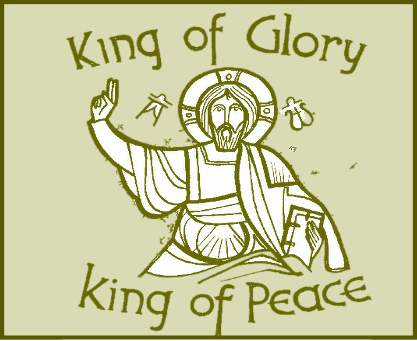The Solemnity of Jesus Christ, King of the Universe
Readings: Ezekiel 34:11-12, 15-17; 1 Corinthians 15:20-26,28; Matthew 25:31-46
The solemnity of Christ the King marks the end of ordinary time and the completion of the Church’s liturgical year. Instituted by Pope Pius XI in 1925, this feast was created to promote devotion to the Universal Lordship of Christ in response to the growing secularism of the Western world. In 1969, Pope Paul VI gave the celebration a new title ‘Jesus Christ, King of the Universe’ and moved it from the last Sunday in October to the last Sunday in the liturgical year. He also transformed it from a feast to a ‘Solemnity.’ But what does it mean to serve Jesus as King? And what kind of kingship are we celebrating?
Our Scripture readings today present us with two different, but complementary, images of the kingship of Christ. In the second reading, from the First Letter to the Corinthians, Paul presents Christ as the victorious ruler of the world, the conqueror of ‘every sovereignty, authority and power’ (1 Cor 15:24). And his reign will last until ‘he has put all his enemies under his feet and the final enemy to be destroyed is death’ (1 Cor 15:25). Unlike the kings of this world, who attain and maintain their power by force and fear, and invariably reap a harvest of death and destruction, the kingship of Christ is a rule of love that is life-giving and life-enhancing: ‘I have come that they may have life, and have it more abundantly (Jn 10:10).
Another image of kingship that emerges from today’s first reading from Ezekiel, is that of a loving shepherd who tends his sheep with consummate care. In this reading, the Lord, the God of Israel, assures his people of his loving concern for them in words of great tenderness and compassion: ‘As a shepherd keeps all his flock in view when he stands up in the middle of his scattered sheep, so shall I keep my sheep in view. I shall rescue them from wherever they have been scattered during the mist and darkness… I shall look for the lost one, bring back the stray, bandage the wounded and make the weak strong (Ezek 34:12, 16). In his ministry, Jesus presents himself as the embodiment of the Good Shepherd, prepared to give lay down his life for his sheep. He launches his Kingdom mission in words that reflect the promises of the Shepherd King: ‘The Spirit of the Lord is upon me, for he has anointed me to bring good news to the afflicted. He has sent me to proclaim liberty to captives, sight to the blind, to let the oppressed go free, to proclaim a year of favour from the Lord’ (Lk 4:18-19).
Yes, Jesus Christ, is a king, but his Kingdom is not of this world (cf. Jn 18:36), though it is meant for this world. Christ has no stately palace, no mighty army, no marble throne. He resides among the needy and the vulnerable of our world: the hungry, the naked, the thirsty, the stranger, the sick and those in prison. The king we are called to worship and serve, as today’s gospel reading illustrates, is a king who identifies himself with the neediest and most neglected of God’s children. And the way he wants to be served is by practical care and concern for these brothers and sisters of ours: ‘I was hungry and you gave me food. I was thirsty and you gave me drink; I was a stranger and you made me welcome; naked and you clothed me, sick and you visited me, in prison and you came to see me’ (Mt 25:35-36).
The challenge of today’s gospel is aptly illustrated by the following story I came across some years ago:
‘There was a queue outside the gates of heaven. Each person was asked the question: ‘Why do you think you should be admitted?’ The first person in the queue, a deeply religious man, said, ‘I studied the Bible every day.’ ‘Very good’, said the Lord. ‘However, we shall have to carry out an investigation to see why you studied the Bible. So please step aside for the moment.’ Next in line was a woman, noted for her piety. She said, ‘Lord, I said my prayers every day without fail.’ ‘Very good’, the Lord answered. ‘However, we’ll have to check out your motives. So step aside for the moment.’ Finally, a publican approached the heavenly gates rather gingerly and said, ‘Lord, I wasn’t a particularly religious man, but my door was always open to the homeless, and I never refused food to anyone who was hungry.’ ‘Very good,’ said the Lord. ‘In your case no investigation is needed. Go straight ahead.’
I end with a though-provoking poem about the Kingship of Christ from the pen of Malcolm Guite:
Our King is calling from the hungry furrows
Whilst we are cruising through the aisles of plenty,
Our hoardings screen us from the man of sorrows,
Our soundtracks drown his murmur: ‘I am thirsty’.
He stands in line to sign in as a stranger
And seek a welcome from the world he made,
We see him only as a threat, a danger,
He asks for clothes, we strip-search him instead.
And if he should fall sick then we take care
That he does not infect our private health,
We lock him in the prisons of our fear
Lest he unlock the prison of our wealth.
But still on Sunday we shall stand and sing
The praises of our hidden Lord and King.
Fr Michael McCabe SMA
To listen to an alternative Homily for this Sunday, from Fr Tom Casey of the SMA Media Centre, Ndola, Zambia please click on the play button below.
|
|

